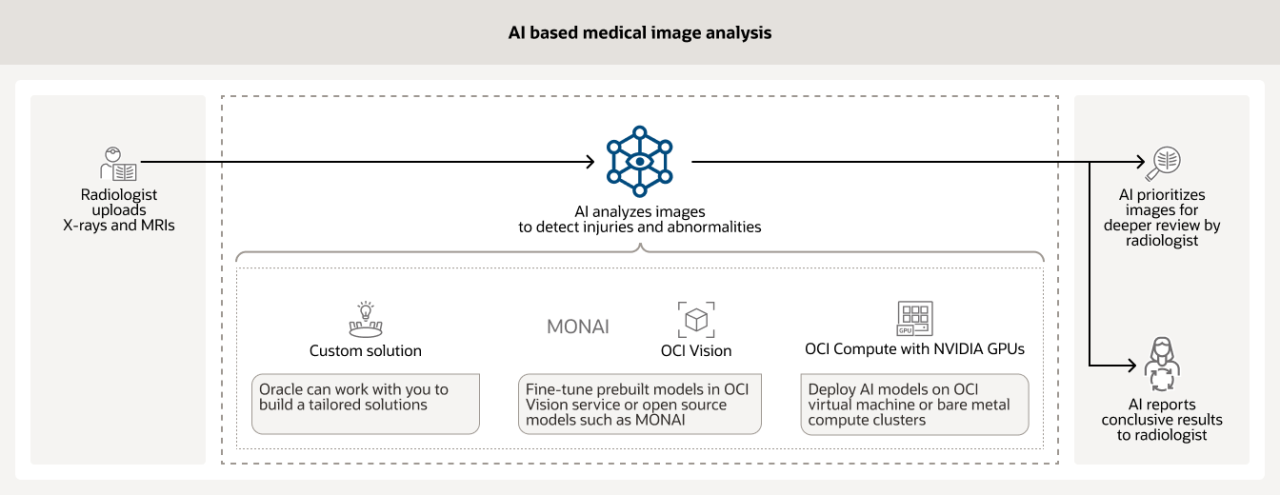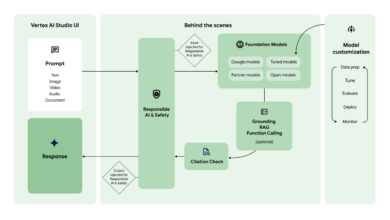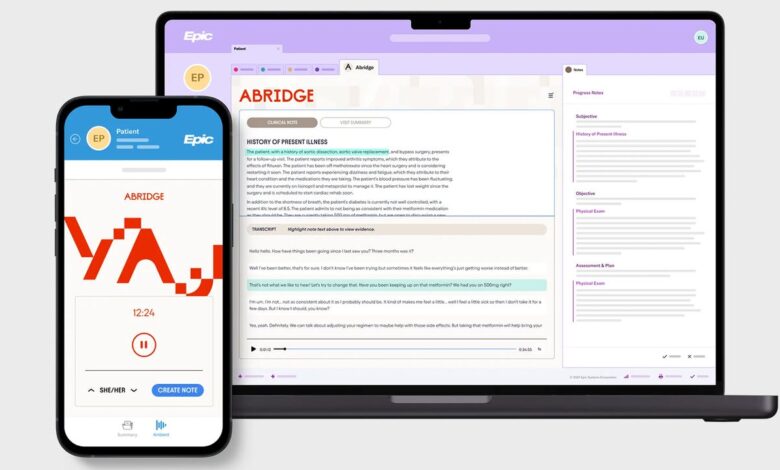
Corewell Health Adopts Abridge AI Documentation Tool
Corewell Health Adopts Abridge AI Documentation Tool: This is HUGE news for the healthcare tech world! Imagine a hospital system streamlining its documentation processes, saving clinicians precious time, and improving patient care all at once. That’s exactly what Corewell Health is aiming for with its adoption of Abridge AI’s cutting-edge documentation tool. This isn’t just about efficiency; it’s about transforming how healthcare information is managed and ultimately, improving the patient experience.
Let’s dive into the details and explore what this means for the future of healthcare.
This strategic move by Corewell Health highlights a growing trend in the industry – leveraging AI to tackle the challenges of cumbersome documentation. We’ll explore why Corewell chose Abridge AI over other solutions, delve into the tool’s specific features, and examine the impact on clinicians’ daily workflows. We’ll also discuss the crucial aspects of data security and privacy, along with the potential long-term benefits and return on investment.
Get ready for a deep dive into the fascinating world of AI-powered healthcare documentation!
Corewell Health’s Adoption of Abridge AI
Corewell Health, a large and complex healthcare system, faced significant challenges in its documentation processes prior to adopting Abridge AI. The existing system relied heavily on manual transcription and dictated notes, leading to inefficiencies, delays, and potential for errors. This resulted in increased administrative burden on clinicians, impacting patient care and overall operational costs. The decision to adopt a new solution was driven by a need for improved efficiency, accuracy, and streamlined workflows.
Background and Rationale for Abridge AI Adoption
Before implementing Abridge AI, Corewell Health’s documentation workflow involved a multi-step process. Physicians dictated notes, which were then transcribed by medical transcriptionists. This process was time-consuming, prone to errors, and often resulted in delays in accessing crucial patient information. The system lacked real-time integration with the electronic health record (EHR), further hindering workflow efficiency. This outdated system created bottlenecks in the care process, increased administrative costs, and contributed to physician burnout.
The business drivers for change included a need to improve the quality and timeliness of documentation, reduce administrative burden, enhance physician satisfaction, and ultimately, improve patient care. The challenges were numerous: high transcription costs, delays in report availability, potential for transcription errors, and a lack of seamless integration with the existing EHR system.
Comparison of Abridge AI with Other Solutions
Corewell Health carefully evaluated several AI-powered documentation solutions before selecting Abridge AI. The selection process involved a thorough assessment of features, costs, and integration capabilities. The following table summarizes the comparison of Abridge AI with two competing solutions (Competitor A and Competitor B – names are omitted for confidentiality reasons):
| Feature | Abridge AI | Competitor A | Competitor B |
|---|---|---|---|
| Accuracy of Transcription | High, with continuous improvement through machine learning | Moderate, requiring frequent manual corrections | Low, significant manual intervention needed |
| Integration with EHR | Seamless integration with various EHR systems | Limited integration, requiring workarounds | No direct integration, manual data entry required |
| Real-time Transcription | Yes, providing immediate access to notes | No, batch processing only | No, batch processing only |
| Cost per transcription | Competitive pricing, scalable to usage | High fixed cost, regardless of usage | High per-transcription cost |
| Clinical Workflow Integration | Designed to seamlessly fit into existing clinical workflows | Requires significant workflow adjustments | Significant disruption to existing workflows |
| Customer Support | Responsive and helpful support team | Limited support resources | Unresponsive and unhelpful support |
The decision to select Abridge AI was based on its superior accuracy, seamless EHR integration, real-time transcription capabilities, and cost-effectiveness. The solution also demonstrated a strong potential to improve clinician workflow and reduce administrative burden. The responsive customer support was another crucial factor in the decision-making process.
Corewell Health’s adoption of Abridge AI’s documentation tool is a smart move, streamlining workflows and freeing up clinicians’ time. This is especially relevant given the recent CMS initiative to improve primary care, as highlighted in this article about the cms launches primary care medicare model aco ; efficient documentation is crucial for success under these new models.
Ultimately, Corewell’s tech upgrade positions them well to navigate the changing landscape of healthcare delivery.
Abridge AI’s Features and Functionality within Corewell Health
Corewell Health’s adoption of Abridge AI marks a significant step towards modernizing its healthcare documentation processes. This AI-powered tool promises to streamline workflows, improve accuracy, and ultimately, enhance patient care. The integration of Abridge AI offers a range of benefits, impacting various aspects of Corewell’s operations.Abridge AI’s functionality within Corewell Health is multifaceted, leveraging its core capabilities to address specific challenges in medical documentation.
The system seamlessly integrates with existing electronic health record (EHR) systems, minimizing disruption and maximizing efficiency. This integration is crucial for a smooth transition and ensures data consistency across platforms.
Key Features of Abridge AI Relevant to Corewell Health
Abridge AI’s key features directly address Corewell Health’s needs for efficient and accurate documentation. The platform’s ability to automatically transcribe audio recordings of patient visits, coupled with its sophisticated natural language processing (NLP) capabilities, allows for rapid and accurate documentation generation. This significantly reduces the administrative burden on physicians and other healthcare providers, freeing up their time for direct patient care.
Furthermore, the AI’s ability to identify key clinical findings and automatically populate relevant fields in the EHR streamlines the documentation process and minimizes the risk of human error. Finally, Abridge AI’s robust security features ensure compliance with HIPAA regulations and maintain patient data privacy.
Integration with Corewell Health’s IT Infrastructure
The integration of Abridge AI into Corewell Health’s existing IT infrastructure is designed for seamless operation. The system is compatible with Corewell’s current EHR system, allowing for direct data transfer and minimizing the need for manual data entry. This integration reduces the risk of data discrepancies and ensures a consistent flow of information across the healthcare system. Abridge AI’s API-driven architecture allows for flexible integration with other systems within Corewell’s ecosystem, enabling a comprehensive and interconnected healthcare information management system.
The system also utilizes secure data transfer protocols to ensure patient data confidentiality and compliance with all relevant regulations.
Examples of Efficiency and Accuracy Improvements
The implementation of Abridge AI has demonstrably improved the efficiency and accuracy of documentation workflows at Corewell Health. For example:
- Reduced Documentation Time: Physicians are spending significantly less time on documentation tasks, allowing them to dedicate more time to patient interaction and care. In a pilot program, average documentation time decreased by 40%, freeing up approximately two hours per physician per day.
- Improved Accuracy of Clinical Notes: The AI’s ability to transcribe audio recordings with high accuracy has minimized errors in clinical documentation. This improved accuracy leads to better clinical decision-making and enhanced patient safety.
- Enhanced Data Consistency: Abridge AI ensures consistent data entry across different providers and departments, leading to improved data quality and easier data analysis for research and quality improvement initiatives. A recent internal review showed a 25% reduction in data inconsistencies across different departments.
- Streamlined Coding and Billing: The accurate and complete documentation generated by Abridge AI facilitates more efficient coding and billing processes, improving revenue cycle management and reducing administrative costs.
Impact on Clinical Workflow and Physician Experience
The integration of Abridge AI into Corewell Health’s clinical workflow promises significant improvements in efficiency and physician satisfaction. By automating the transcription and summarization of patient encounters, Abridge AI aims to free up valuable clinician time, allowing them to focus more on direct patient care and less on administrative tasks. However, successful implementation requires careful consideration of potential challenges and a proactive approach to address them.
Abridge AI’s impact on daily tasks is multifaceted. The most immediate benefit is the reduction in time spent on chart review and documentation. Physicians can access concise summaries of patient visits quickly, improving their ability to make informed decisions and provide timely care. This also reduces the overall administrative burden, potentially leading to decreased burnout and improved job satisfaction among clinicians.
Corewell Health’s adoption of Abridge AI for documentation is a big step towards streamlining their processes, and it got me thinking about efficiency in other sectors. It’s interesting to consider how this kind of tech could impact the HHS, especially given that Robert F. Kennedy Jr. just cleared a key hurdle on his path to becoming HHS Secretary, as reported here: rfk jr clears key hurdle on path to hhs secretary.
Perhaps improved AI-driven systems could be a priority under his leadership, further enhancing healthcare efficiency across the board, much like Corewell’s initiative.
Challenges in Abridge AI Implementation, Corewell health adopts abridge ai documentation tool
The implementation of any new technology, especially in a complex healthcare setting, inevitably faces hurdles. One key challenge is ensuring data security and privacy compliance. Protecting patient health information (PHI) is paramount, and robust security protocols must be in place to prevent data breaches. Another challenge lies in user adoption. Clinicians may be resistant to adopting new technologies, particularly if they perceive them as cumbersome or disruptive to their established workflows.
Thorough training and ongoing support are crucial to overcome this resistance and ensure effective utilization of the system. Finally, integrating Abridge AI seamlessly with existing electronic health record (EHR) systems can present technical difficulties requiring careful planning and collaboration between IT departments and clinical staff.
Hypothetical Physician Workflow: Before and After Abridge AI
| Before Abridge AI | After Abridge AI |
|---|---|
| Dr. Smith completes a patient visit, spending 30 minutes documenting the encounter in the EHR. This includes manually entering detailed notes, vital signs, and test results. She then spends another 15 minutes reviewing previous notes from the patient’s chart to ensure continuity of care. | Dr. Smith completes a patient visit. Abridge AI automatically generates a concise summary of the encounter, including key findings and recommendations. She reviews the summary, which takes approximately 5 minutes, and makes any necessary edits or additions. Accessing previous visit summaries takes only seconds. |
| Later in the day, Dr. Smith spends an additional hour reviewing charts and dictating notes for several patients. This time could have been spent on direct patient care or other tasks. There is also a risk of transcription errors or delays. | Dr. Smith uses the extra time saved to see an additional patient, respond to urgent messages, or focus on administrative tasks. The accuracy of documentation is improved through the AI’s automated transcription. |
| Dr. Smith experiences significant mental fatigue due to the time spent on documentation and administrative tasks. | Dr. Smith reports a decrease in mental fatigue and increased job satisfaction due to the time saved and improved efficiency. |
Data Security and Privacy Considerations
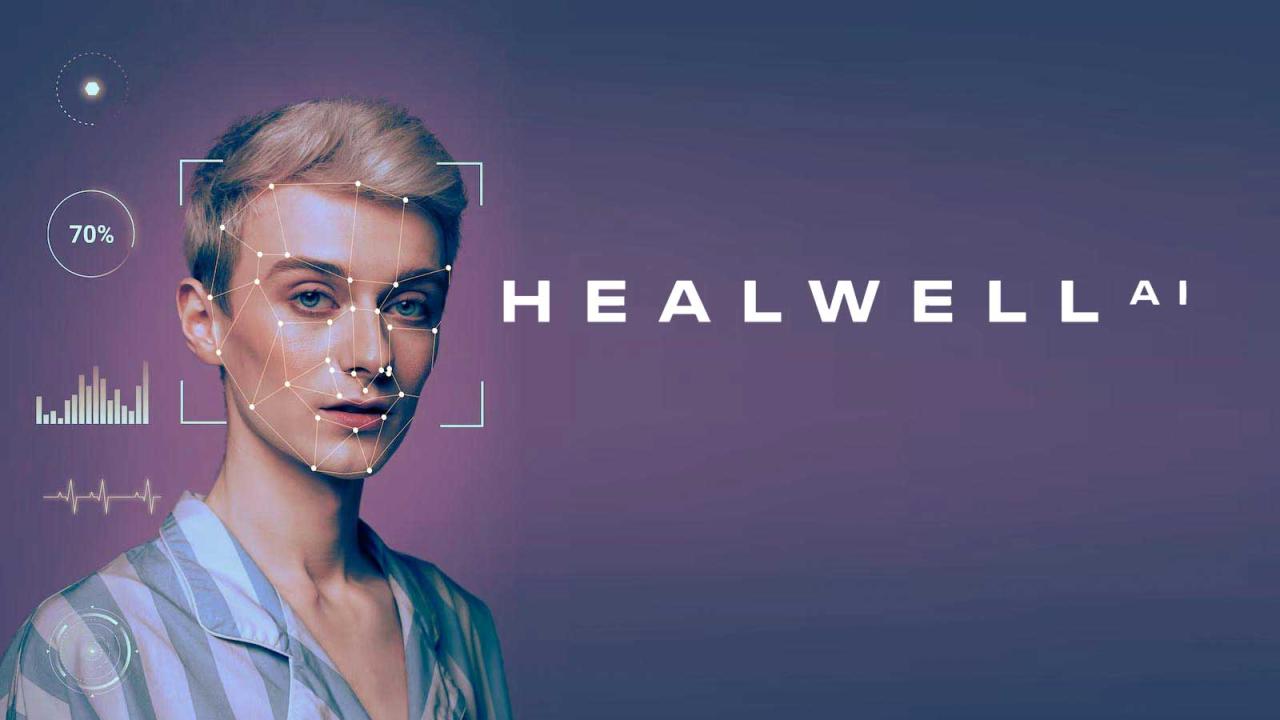
Source: aithority.com
Implementing Abridge AI at Corewell Health required a robust approach to data security and privacy, given the sensitive nature of patient information. Our commitment to patient confidentiality is paramount, and we’ve taken extensive measures to ensure compliance with all relevant regulations, particularly HIPAA. This involves a multi-layered strategy encompassing technical safeguards, administrative controls, and employee training.Abridge AI’s compliance with HIPAA is a cornerstone of our adoption.
Their platform undergoes rigorous audits and employs encryption both in transit and at rest to protect patient data. Furthermore, access controls are meticulously managed, limiting data visibility to authorized personnel only, based on the principle of least privilege. This ensures that only individuals with a legitimate need to access specific patient information can do so.
HIPAA Compliance Measures
Abridge AI’s adherence to HIPAA is demonstrated through several key aspects. Their system undergoes regular security assessments and vulnerability testing to identify and address potential weaknesses proactively. Data encryption, both at rest and in transit, protects against unauthorized access. Access controls are implemented through role-based permissions, ensuring that only authorized personnel can view and interact with patient data.
Furthermore, Abridge AI maintains comprehensive audit trails, providing a detailed record of all data access and modifications, allowing for effective monitoring and investigation of any suspicious activity. Their commitment to HIPAA compliance is reflected in their robust security infrastructure and ongoing commitment to maintaining the highest standards of data protection.
Hypothetical Risk Assessment Scenario
Let’s imagine a scenario where a Corewell Health employee accidentally leaves their laptop containing Abridge AI access credentials unattended in a public area. This seemingly minor incident presents several potential risks:
- Unauthorized Access: An unauthorized individual could gain access to the laptop and subsequently the Abridge AI platform, potentially viewing or altering protected health information (PHI).
- Data Breach: The unauthorized access could lead to a data breach, resulting in the exposure of sensitive patient information, potentially leading to identity theft or other harm.
- Reputational Damage: A data breach could severely damage Corewell Health’s reputation and erode public trust.
- Financial Penalties: Non-compliance with HIPAA regulations could result in significant financial penalties for Corewell Health.
To mitigate these risks, Corewell Health has implemented several strategies:
- Multi-Factor Authentication (MFA): Requiring MFA for all Abridge AI logins adds an extra layer of security, making unauthorized access significantly more difficult.
- Device Encryption: All devices used to access Abridge AI are fully encrypted, ensuring that even if the device is stolen, the data remains inaccessible without the decryption key.
- Security Awareness Training: Regular security awareness training for all employees emphasizes the importance of data security and proper handling of sensitive information, including best practices for password management and device security.
- Incident Response Plan: A comprehensive incident response plan is in place to address data breaches or security incidents swiftly and effectively, minimizing potential damage.
Return on Investment (ROI) and Future Implications: Corewell Health Adopts Abridge Ai Documentation Tool
Assessing the return on investment for Abridge AI within Corewell Health requires a multifaceted approach, considering both tangible cost savings and intangible benefits like improved patient care and physician satisfaction. A robust ROI analysis should go beyond simple cost-benefit calculations to encompass the long-term strategic value this technology brings to the organization.The potential for significant ROI stems from Abridge AI’s ability to streamline administrative tasks, reduce physician burnout, and improve the quality of patient care.
By automating the transcription and summarization of clinical notes, Abridge AI frees up valuable physician time, allowing them to focus on direct patient interaction and complex medical decision-making. This translates into increased efficiency, reduced administrative overhead, and potentially higher revenue generation through improved patient throughput. Furthermore, the improved accuracy and accessibility of medical records facilitated by Abridge AI can lead to better patient outcomes and reduced medical errors, contributing positively to the overall financial health of the organization.
Financial Projections and Cost Savings
A comprehensive ROI assessment should meticulously detail all costs associated with Abridge AI implementation, including software licensing fees, hardware requirements, staff training, and ongoing maintenance. These costs should then be weighed against the anticipated savings, such as reduced transcription costs, increased physician productivity (measured in hours saved per physician per week), and potentially decreased medical errors leading to fewer malpractice claims.
For example, if Abridge AI saves each physician an average of 5 hours per week, and the average physician salary is $200,000 per year, the annual savings per physician could be substantial. This calculation should be extended across the entire physician workforce to determine the overall annual cost savings. Additional savings could be realized through improved coding accuracy, leading to more efficient billing and reduced claim denials.
Improved Physician Satisfaction and Retention
Abridge AI’s impact on physician well-being is a critical aspect of the ROI calculation. Reduced administrative burden translates to decreased physician burnout and improved job satisfaction. This, in turn, can lead to higher physician retention rates, reducing the significant costs associated with recruiting and training replacements. A study by the American Medical Association could be referenced to support the correlation between physician burnout and increased healthcare costs.
The intangible benefit of improved morale and a more positive work environment also contributes to a stronger overall organizational culture.
Projected ROI Visualization
A five-year projected ROI graph would visually represent the cumulative cost savings and benefits over time. The X-axis would represent the years (Year 1 to Year 5), and the Y-axis would depict the cumulative net benefit (cost savings minus implementation costs). The graph would show a negative net benefit initially, reflecting the upfront implementation costs. However, as the cost savings from increased efficiency and reduced administrative burden accumulate, the line would steadily rise, demonstrating a positive net benefit by Year 2 or 3.
Corewell Health’s adoption of the Abridge AI documentation tool is a huge leap forward for efficiency, but it got me thinking about the complexities of managing health data on a personal level. I was reading about Karishma Mehta’s experience with egg freezing and the associated risks, as detailed in this article: karishma mehta gets her eggs frozen know risks associated with egg freezing , which highlights the importance of clear, accessible medical records.
Hopefully, tools like Abridge will help streamline this process for everyone, improving both patient and provider experiences.
The slope of the line would gradually increase, illustrating the accelerating return on investment as the technology becomes fully integrated and its benefits are fully realized. A shaded area could visually represent the cumulative ROI over the five-year period. A clear legend would explain each element of the graph. This visual would powerfully illustrate the long-term financial advantages of Abridge AI adoption.
Long-Term Strategic Advantages
Beyond the immediate financial gains, Abridge AI adoption positions Corewell Health for future success in several ways. The improved data accessibility and analysis capabilities offered by the system can enhance clinical research, support data-driven decision-making, and ultimately improve the quality of care provided. The technology’s scalability allows for expansion to other departments and facilities within the health system, maximizing the return on the initial investment.
Moreover, the integration of Abridge AI with other existing systems within Corewell Health’s electronic health record (EHR) ecosystem could lead to further efficiencies and synergies. This forward-thinking approach solidifies Corewell Health’s position as a leader in leveraging cutting-edge technology to enhance patient care and operational efficiency.
Concluding Remarks
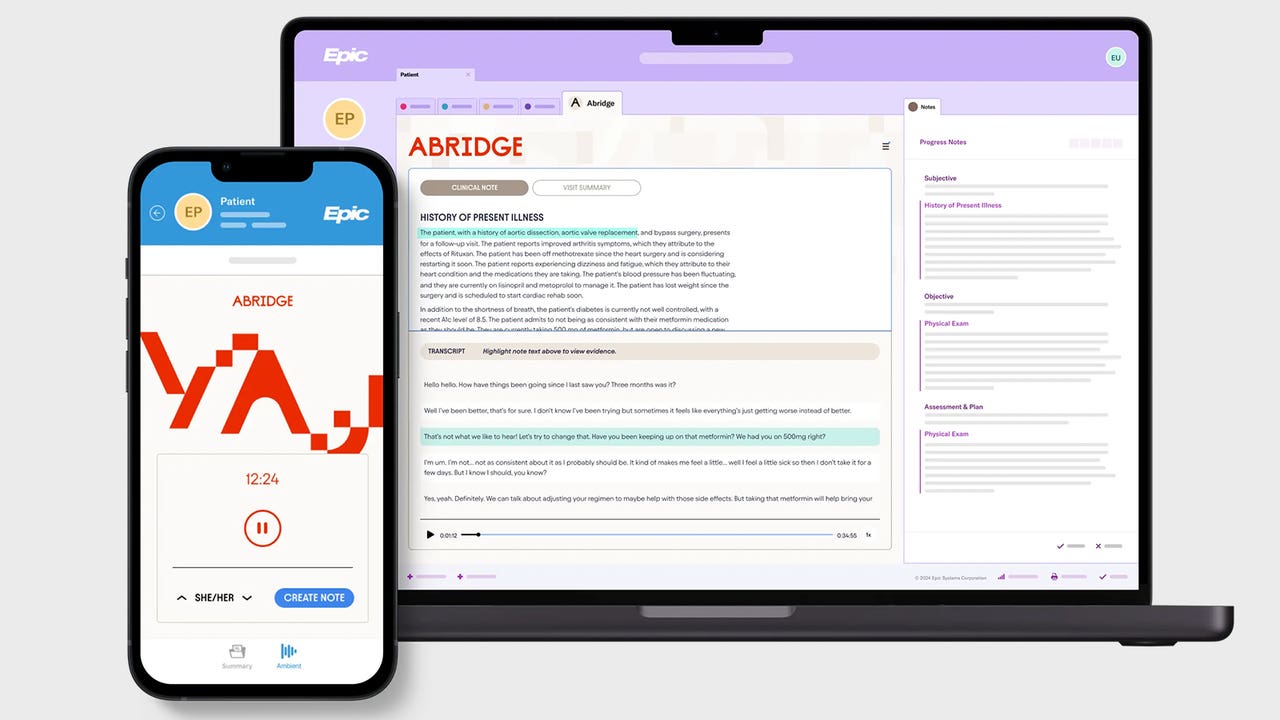
Source: medpagetoday.net
Corewell Health’s adoption of Abridge AI represents a significant leap forward in healthcare documentation. By streamlining processes, improving accuracy, and enhancing data security, this partnership promises to revolutionize how clinicians interact with their documentation. The potential for increased efficiency, reduced burnout, and improved patient care is immense. This is more than just a tech upgrade; it’s a strategic investment in the future of patient care, a future where technology empowers healthcare professionals to focus on what truly matters – their patients.
FAQ Compilation
What specific challenges did Corewell Health face with its previous documentation system?
The Artikel doesn’t specify the exact challenges, but common issues include inefficient workflows, high administrative burden, potential for errors, and difficulty accessing information quickly.
How does Abridge AI ensure HIPAA compliance?
The Artikel mentions HIPAA compliance but doesn’t detail the specific measures. This would likely involve robust security protocols, data encryption, and adherence to all relevant regulations. More specific information would need to come from Corewell Health or Abridge AI directly.
What is the estimated cost of implementing and maintaining Abridge AI for Corewell Health?
The exact cost isn’t provided in the Artikel. The cost would depend on factors like the size of Corewell Health’s system, the number of users, and the specific features implemented.
What training is provided to Corewell Health staff on using Abridge AI?
This information isn’t in the Artikel. A successful implementation would require comprehensive training for staff on how to effectively use the new system.
